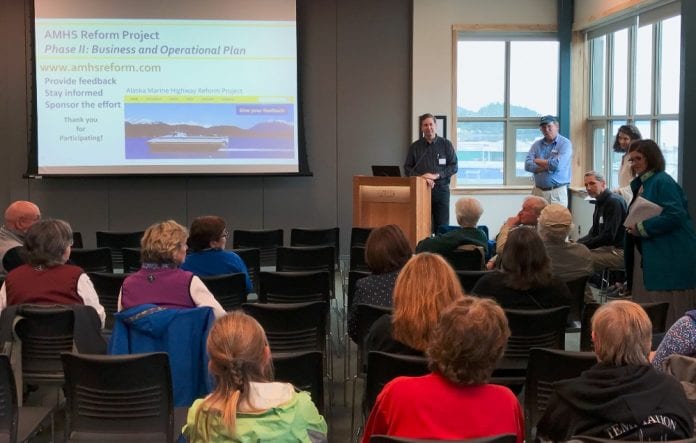
Dennis Watson wasn’t about to sugarcoat the dire financial status of the Alaska Marine Highway System.
“The Legislature has painted a target on it,” the chairman of the Alaska Marine Highway System Reform Project told some 40 people gathered for the community meeting at the Cordova Center on July 11.
Funding to the Alaska Marine Highway Service, on which many landlocked or island-bound rural, coastal communities depend, is one of many line items in the budget taking a hit as the state tries to work its way out of a financial crisis.
Taskforce representatives arrived in Cordova on July 10. Three meetings were held July 11, including a public forum to offer residents with information on what the AMHS Reform Project is about, and to hear their opinions on the ferry service.
Watson, also the mayor of Craig, was joined by Southeast Conference Executive Director Robert Venables, who chairs the Marine Transportation Advisory Board; Wanetta Ayers, interim executive director of the Prince William Sound Economic Development District; Jim Calvin, managing principal and senior economic analysis with the McDowell Group, out of Juneau; and Rebecca Braun, policy director to Alaska Gov. Bill Walker.
Efforts to reform and revitalize the state’s ferry system began in May 2016.

Photo by Cinthia Gibbens-Stimson/The Cordova Times
Phase one, focused on possible organizational reforms and governance models for AMHS, was completed in November of 2016. The resulting AMHS Governance Study recommended converting the system to a public corporation, according to a statement issued by Ayers.
During a slideshow presentation on phase two, Watson, Venables and Calvin talked about the phases involved in the reformation of the state’s ferry system. Phase two focuses on reviews of financial operations, assessments of funding sources and ways to save money, and how to go about optimizing the fleet, ferry schedules and management processes.
A public corporation, managed by a board of directors appointed by the governor, and run by state statutes, might possibly better-manage Alaska’s ferry system, Braun said.
“Examples of public corporations that we already have in place are the Alaska Railroad, the Alaska Housing Finance Corp., and the Alaska Permanent Fund Corp.,” she said. “The governor and lieutenant governor recognized early on that AMHS had a shaky future and they wanted to do something about it. We’re here because the governor’s office knows we need Alaskans to do this.”
Venables said he has a passion for the ferry system, as does Cordova.
“Cordova is actively participating and engaged in this project,” he said. “This is an historic opportunity. I have never seen a governor reach out to Alaskans statewide, to gather and give us a solution.”
AMHS will never make money, said Calvin.
“It’s not a system that will ever pay for itself. One of the biggest challenges we’re facing is how to keep this aging fleet afloat. We have to make this service less dependent upon state general revenue funds,” he said.

Photo by Cinthia Gibbens-Stimson/The Cordova Times
“The question is what do you want your ferry service to look like?” asked Ayers.
“How can it best operate in the most efficient manner? What aspects of ferry service are important to you?”
Dave Chipman, owner of the Alaskan Hotel and Bar, and Sylvia Lange, owner of the Reluctant Fisherman Inn, told the task force that they are taking fewer trips on the ferry each year, due to poor scheduling of the ferries and the unavailability of the fast ferry Chenega, now in dry dock.
The Aurora, currently only ferry serving Cordova, takes six hours to travel from Cordova to Whittier, versus about three hours via the Chenega.
Lange also said inconvenient ferry schedules also impact her business revenue, as the turnaround time in Cordova is either too short, or too long.
Pete Mickelson said that returning to Cordova recently after visiting Fairbanks, he boarded the ferry at Valdez. With a stop in Whittier, it took the ferry 13 hours to reach Cordova.
“I’m retired. I have time,” he said.
Without ferry service, the only other options for travel to and from Cordova are Alaska Airlines jets or Ravn Air’s turboprop planes.
“We view ferry service as what we deserve for not having a highway,” said resident Nancy Bird.
The open house events are an effort to engage Prince William Sound communities on ferry issues, and help them understand the role the ferry system plays in the region. Events were also scheduled for Whittier and Valdez on July 12-13, respectively.
A draft of the phase two report will be presented at the Southeast Conference’s annual meeting, Sept. 19 – 21 in Haines. It is anticipated that these findings will be advanced for consideration by the Alaska State Legislature during its 2018 legislative session.
Venables encouraged residents to sign up for updates to the ferry reform initiative at http://www.amhsreform.com
The site provides background information on the project, a venue to give comments online, and other ways to participate in the project, he said.
“There are questions there designed to get people thinking, and there are places to leave comments. We want to hear from you and we want to know what you want your ferry service to look like. If you have thoughts on how to save money or increase revenue, we want you to share those ideas,” he said.














